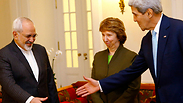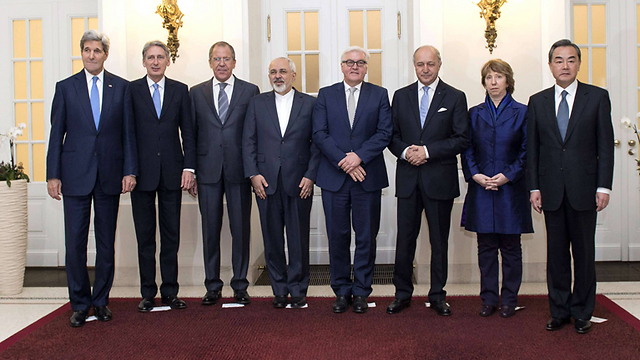
Despite nuclear talks' extension, Iran is still on the verge of a bomb
Analysis: Decision to extend Geneva interim agreement holds several advantages and potential risks. It will be Western intelligence organizations' job to minimize risks and prevent Iran from using next seven months to advance its nuclear ambitions.
Anyone who knows how complicated the negotiations are, technically and politically, understands that the temporary interim agreement reached in Geneva a year ago is the maximum compromise the world powers (the five permanent Security Council members and Germany) are able to achieve with Iran.
The attempt to reach a permanent agreement which would completely remove the risk of Iran becoming militarily nuclearized, in exchange for a removal of the sanctions, failed because Iran is unprepared to give up its status as a nuclear threshold state and is prepared to pay a heavy economic price for that.
Moreover, it still wants to shorten as much as possible the period of time needed to "break through" towards a nuclear weapon, so that the Western intelligence will not have enough time to discover that Iran has already begun producing an atomic weapon and in order to neutralize a military action which would stop the ayatollahs before they cross the finish line.
But the West isn't giving up either. Speaking at a press conference in Vienna, US Secretary of State John Kerry clarified that he and his allies hoped the situation would change for the better in seven months' time. How? Kerry implied that there is more to the progress made in the past year of negotiations than what meets the eye, and he may also be hoping that processes within the Iranian society will lead to a change in supreme leader Ali Khamenei's tough stance.
In any event, at the moment the West would rather not declare that the efforts to reach an agreement have failed. Such an announcement would be met with a Congress demand to step up the sanctions. Khamenei and the Iranian Revolutionary Guards might respond by breaking the rules of the game and "breaking through" towards the bomb. In such a case, the United States and/or Israel would have to decide whether to strike in Iran in order to prevent the worst possible scenario. Yes, Israel is capable of striking in Iran.
This scenario is one of the main reasons why the parties agreed to extend the interim agreement, under which the Iranian uranium enrichment project is almost completely frozen. The Islamic Republic can enrich uranium to a high level (90%) for one nuclear explosive device within three to six months, but it will take at least another year and a half to develop an explosive device and nuclear warhead for a missile, leaving Iran in the status of a threshold state which is about 18 months away from a first bomb.
The agreement gave Iran an insignificant easement of the sanctions which is incapable for leading to an improvement in its economy, as many in the country expect and demand. Iranian President Hassan Rouhani promised, but Khamenei is in no hurry to fulfill. This is the stick still being waved over Iran's head, and the US leverage which may cause Iran to agree to a compromise which will satisfy the West later on. That way, each side holds on to the bargaining chips it had at the beginning of the negotiations, hoping to find a creative solution to the current deadlock.
The talks failed because neither side got what it wanted. The Americans and Europeans failed to convince the Iranians to limit the number of centrifuges, to prevent the installment of centrifuges of newer models and to limit the amount of enriched uranium to a low level.
The Americans failed in another area: They did not get the Iranians to agree to invasive supervision, which would allow unexpected inspections, especially in places where the Western intelligence services say Iran is developing a nuclear weapon.
Kerry hinted that that was the main bone of contention. The world powers are concerned that Iran is secretly developing a weapons system, including a primitive nuclear explosive device, followed by a warhead for a missile.
The West doesn’t know what Iran is doing in the thousands of burrows excavated in its mountains in recent years. The West's representatives demanded that the International Atomic Energy Agency (IAEA) inspectors would be able to hold unexpected visits to these sites. Iran rejected that out of hand and failed to answer the IAEA's questions regarding information on the nuclear weapons program.
According to the same information, this weapon was planned and tested at least in one military camp near the city of Parchin, not far from Tehran.
The Iranians didn’t get what they firmly demanded either: The West refused to lift the sanctions immediately upon signing the agreement, or making it valid for only two to three years, as Iranian Foreign Minister Mohammad Javad Zarif demanded. He also demanded that once those years came to an end, Iran would be able to do as it pleased in the nuclear field, without any supervision apart from routing IAEA inspections.
There is no wonder, therefore, that both sides agreed not to agree and preferred to extend the interim agreement, which still provides each side with something.
Now it remains to be seen whether it will be possible to reach a reasonable agreement on principles between the West and Iran by March 2015, and whether it will be possible to sign a permanent agreement in July.
The West's minimum demand is that a detailed permanent agreement will keep Iran at least one year away from the bomb. Israel is not settling for such an achievement and is arguing that being one year away from a bomb makes Iran a country with a nuclear weapon for all intents and purposes. But Kerry insists, and has even implied that a lot of progress has been made in the talks. No one knows what progress was made.
In any event, US President Barack Obama stands to benefit the most, as the media and Congress cannot accuse him for now of another failure in his foreign policy.
The lesser of two evils
Israel is satisfied with the extension mainly because it thwarts a "bad agreement," as it is called in Jerusalem. In the current situation, Iran cannot expand its centrifuge lineup and increase the amount of uranium enriched to a low level (3.5-5%) which it can produce and enrich to the level of fissile material, and the burden of the sanctions remains unchanged. This is the lesser of two evils.
As for the permanent agreement, Israel is demanding that Iran will not be allowed to enrich Iranian at all, but as the West does not accept this demand, Israel will accept a situation in which Iran will have no more than 4,500 to 5,000 active centrifuges, and that the amount of uranium enriched to a low level will not exceed 7,000 to 8,000 kilograms – the amount required for the production of one nuclear explosive device.
Israeli officials are still very worried. The shortcoming of the current situation is that Iran can secretly develop a nuclear weapon, even during the talks. This can be done in small facilities latently. The Iranians specialize in deceptive activity of this kind, which the Western and Israeli intelligence will find it difficult to expose.
This is a real danger because if the process of developing a nuclear weapon is completed, Iran will be able to considerably shorten the period of time between from the decision to produce a nuclear weapon and its actual production.
The second shortcoming is that the interim agreement does not limit Iran's ability to develop and produce centrifuges of newer models, which enrich uranium at a double and triple pace than the outdated centrifuges it has now, and Iranian scientists can install them within several months and enrich the uranium at a low level to the level of fissile material at a much higher speed.
The third negative point is that there is no restriction on Iran's ability to develop and produce accurate and fast ballistic missiles which could carry a nuclear warhead.
These points basically allow Iran not only to maintain its status as a nuclear threshold state, but also to shorten the time needed to "break through" towards a bomb without violating the interim agreement and without causing the West to cancel the easement of the sanctions.
This is the main risk involved in the extension. The intelligence organizations of the US, Britain, France, German and Israel will have to minimize this risk. They are the only ones capable of thwarting the alarming possibility that Iran will use the next seven months to advance its nuclear ambitions.











